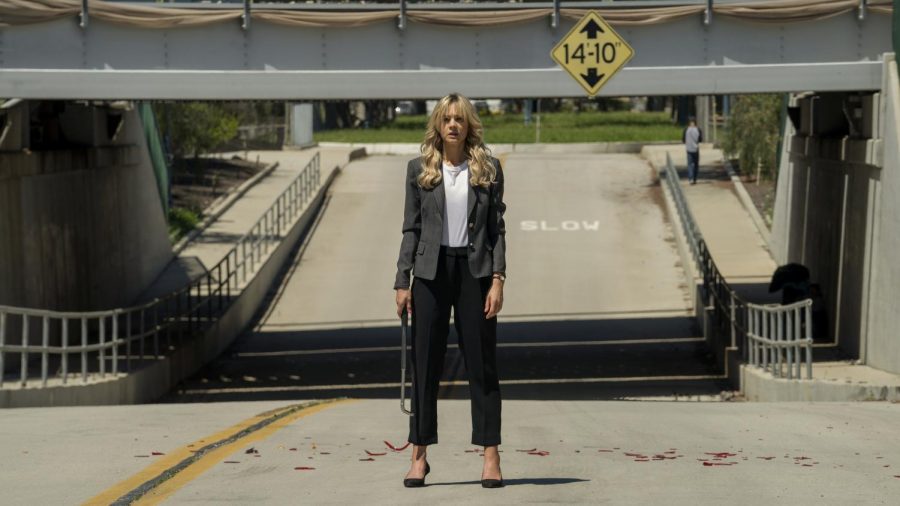Review: ‘Promising Young Woman’ more than delivers on its promise
Merie Weismiller Wallace / Focus Features
Carey Mulligan stars as ‘Cassandra’ in director Emerald Fennell’s PROMISING YOUNG WOMAN, a Focus Features release.
February 9, 2021
Content Warning: Discussion of sexual assault and suicide
Spoilers for “Promising Young Woman” ahead
One of the buzziest late-breaking entries in this Oscar season is Focus Features’ “Promising Young Woman.” The advertisements set up the film as a revenge thriller in the vein of “Kill Bill” or “The Girl with the Dragon Tattoo.” In actuality, it is a cautionary tale about the dangerous and addictive nature of revenge, and how it can reinforce and strengthen self-hatred, making “Promising Young Woman” the ultimate anti-revenge thriller. At the same time, it also manages to critically analyze the predatory nature of “nice guys,” and the consequences of the systems that support their bad behavior.
The most striking element of this film is the juxtaposition of the serious subject matter with the whimsical tone established by its lurid color palette and use of pop music needle drops, including some fantastic original songs that deserve more attention than they are getting. This sense of fun is pervasive throughout most of the film’s runtime, which makes its intense ending all the more jarring.
This candy-colored commentary on sexual assault and trauma is written and directed by Emerald Fennell, who was previously known for her work as an actress and as the showrunner for season two of the TV series “Killing Eve.” This is her directorial film debut, and she has certainly made an impression, as she is already being predicted as a frontrunner for Best Original Screenplay and Best Director at the 93rd Academy Awards ceremony in April and racking up nominations for precursor awards, including the Golden Globes. It is not hard to understand why so many viewers have been inspired by this film due to its new ideas about such an important and socially relevant subject matter.
The film stars Carey Mulligan as Cassie, a 30-year-old medical school dropout who lives with her parents and spends her days working at a coffee shop. The focus of the film, though, is how she goes to bars at night, pretending to be falling down drunk and getting revenge on the men who try to take advantage of her. As the film progresses, the audience is slowly let in on Cassie’s motivation behind this obsessive behavior. It is revealed that her life-long best friend, Nina, was raped while drunk at a party in medical school. There were several witnesses, and Cassie tried to get help from the administration at the school, but no one was willing to believe Nina over the rapist. This caused Cassie and Nina to drop out and eventually led to Nina’s suicide.
Mulligan, who is best known for her roles in period films like “An Education” and “Wildlife,” truly shines in a daring role that shows how wide-ranging and versatile of a talent she is. Due to the syrupy production design and fantastical use of sensory elements, this film could be dismissed as too otherworldly and dream-like. However, Mulligan’s performance — along with the deep bench of incredible supporting performances — grounds and adds humanity to the film, turning it into a disturbingly realistic portrait of obsession, self-hatred and the patriarchal society we live in.
The most notable part of the fantastic ensemble at work in “Promising Young Woman” is the set of Hollywood’s foremost “nice guy” actors, such as Bo Burnham, Chris Lowell, Adam Brody, Max Greenfield, Sam Richardson and perhaps most hilariously, Christopher Mintz-Plasse, who starred memorably as Fogell, also known as “McLovin” in “Superbad.” Other truly spectacular supporting performances include Jennifer Coolidge as Cassie’s mom, Alison Brie as her ex-friend from medical school and Laverne Cox as her boss.
The film begins hurtling towards its tragic but inevitable conclusion when Cassie begins dating a former medical school classmate, Ryan (Burnham). He is eventually revealed to not be as nice of a guy as he first seemed, so when Cassie learns that Nina’s rapist is getting married, she is inspired to shift her vengeful focus from random guys to the people who led to Nina’s death. The final step of her revenge plot entails confronting Nina’s rapist at his bachelor party, at which point he tearfully smothers her to death before unceremoniously burning her body.
It might seem like the main character’s murder is the biggest twist this film can pull off, but it is immediately followed by the brilliant revelation that Cassie went to the house to die. Furthermore, it becomes clear that her death was meant to not only punish Nina’s rapist by leading to his arrest in the middle of his wedding but also herself for not being able to prevent Nina’s rape. This quasi-suicide reveals how deeply unhealthy and addictive Cassie’s search for vengeance truly was, which is unsettling for the audience after having spent the majority of the movie cheering her on as she punished each man for his despicable behavior. This need for self-reflection after the film makes it a challenging watch that requires a series of disclaimers before any recommendation, but it is also what makes it the most poignant movie about gender I have ever seen and certainly one of the best movies of the year.







